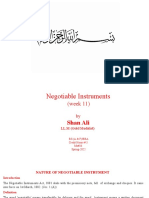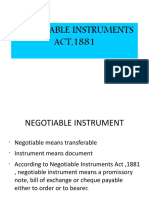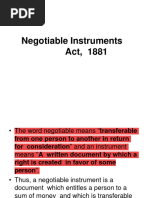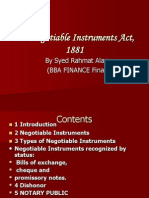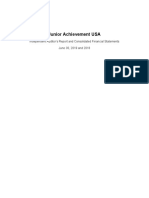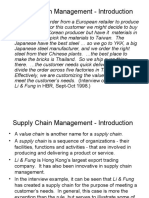Week 13 Session 26-Bills of Exchange & Promissory Note
Uploaded by
Gaurav NaulakhaWeek 13 Session 26-Bills of Exchange & Promissory Note
Uploaded by
Gaurav NaulakhaWeek 13
Session 26-Bills of Exchange & Promissory Note
*Bills of Exchange: Section 4
A bill of exchange is an instrument in writing
Containing an unconditional order
Signed by the maker
Directing a certain person
To pay a certain sum of money only to-
1] A certain person or
2] The order of a certain person or
3] The bearer of the instrument
*Essential Characteristics of Bills of Exchange:
1] It must be in writing.
2] It must contain an express order to pay.
3] The order to pay must be definite and unconditional.
4] It must be signed by the drawer or the maker.
5] The sum contained in the order must be certain.
6] The order must be to pay money only.
7] The drawer, drawee and the payee must be certain.
8] It must be stamped.
*Parties to a bill of exchange:
1] Drawer:
The person who draws the bill i.e. the person who makes the bill is called as
a drawer.
His liability is secondary and conditional.
His liability is primary and conditional until the bill is accepted.
2] Drawee:
The person on whom the bill is drawn is called the drawee.
On the acceptance of the bill:
>He is called as acceptor
>He becomes liable for the payment of the bill
>His liability is primary and unconditional
3] Payee:
The person to whom money is to be paid and who is named in the bill is
called the payee.
*Specimen of a bill of exchange:
*Promissory Note-Section 4
*Meaning of promissory note:
A promissory is an instrument in writing
>containing an unconditional undertaking
>signed by the maker
>to pay a certain sum of money only to-
A certain person; or
The order of a certain person; or
The bearer of the instrument
*Essential characteristics of promissory note:
1] In writing-An oral promise to pay is not sufficient.
2] Express promise to pay-There must be an express promise to pay. Mere
acknowledgement of indebtedness is not sufficient.
For example- Mr. B I owe you Rs.1000. There is no promise to pay and
therefore such an acknowledgement of indebtedness doesn’t constitute a
promissory note.
3] Definite and unconditional promise- If a promise to pay is dependent
upon an event which is certain to happen, although the timing of its happening
is uncertain, the promise to pay is unconditional.
For example-
1) I promise to pay B Rs.500 seven days after my marriage with C. The
promise here is conditional since the promise is dependent upon the
marriage of the promisor with C which may or may not happen.
2) I promise to pay B Rs.500 on D’s death. The promise here is
unconditional since the promise is dependent upon the death of D which
is certain to happen but only its time of happening is uncertain.
4] Signed by Maker- A promissory note must be signed by the maker. The
signatures may be made on any part of the instrument.
5] Promise to pay a certain sum- The promise must to a pay a certain
(determined and ascertained) amount of money.
6] Promise to pay money only- A promissory note must contain a promise to
pay money and money only. No payment in kind is viable.
7] Payee must be certain-The name of the payee must be specified in the
promissory note, otherwise it will be invalid.
As per the provisions of the RBI Act, 1934, a promissory note cannot be made
as payable to the bearer.
*Parties to a promissory note:
1] Maker-The person who makes the promissory note is called the maker. His
liability is primary and unconditional.
2] Payee-The person to whom money is to be paid and who is named in the
promissory note is called the payee.
*Specimen of a promissory note:
You might also like
- 10 Concept and Importance of Negotiable Instruments100% (2)10 Concept and Importance of Negotiable Instruments7 pages
- NStatConDigest - Matuguina Integrated Wood Products vs. CA, GR 98310 (24 Oct. 1996)No ratings yetNStatConDigest - Matuguina Integrated Wood Products vs. CA, GR 98310 (24 Oct. 1996)1 page
- Unit - 2 Negotiable Instrument Act Legal Aspects of Business Ty - Bba (Sem - 5)No ratings yetUnit - 2 Negotiable Instrument Act Legal Aspects of Business Ty - Bba (Sem - 5)15 pages
- Presentation - NEGOTIABLE INSTRUMENT ACTNo ratings yetPresentation - NEGOTIABLE INSTRUMENT ACT30 pages
- unit-vii-law-relating-to-negotiable-instruments-2-857203151720435483No ratings yetunit-vii-law-relating-to-negotiable-instruments-2-85720315172043548342 pages
- 02.3_Sec 4^J5 and 6 of Negotiable Instrument ActNo ratings yet02.3_Sec 4^J5 and 6 of Negotiable Instrument Act7 pages
- Unit VII The Negotiable Instruments Act, 1881No ratings yetUnit VII The Negotiable Instruments Act, 188142 pages
- Nature of Negotiable Instruments: Meaning & DefinitionNo ratings yetNature of Negotiable Instruments: Meaning & Definition9 pages
- Negotiable Instruments 11 08052023 085030pmNo ratings yetNegotiable Instruments 11 08052023 085030pm46 pages
- Chapter 05 Negotiable Instruments Act 1881 1229869805849562 1No ratings yetChapter 05 Negotiable Instruments Act 1881 1229869805849562 111 pages
- 11 Accountancy Notes Ch06 Accounting For Bills of Exchange 02100% (1)11 Accountancy Notes Ch06 Accounting For Bills of Exchange 0228 pages
- The Negotiable Instruments Act, 1881: by Syed Rahmat Alam (Bba Finance Final)No ratings yetThe Negotiable Instruments Act, 1881: by Syed Rahmat Alam (Bba Finance Final)44 pages
- Annexure III Negotiable Instrument Act 1881No ratings yetAnnexure III Negotiable Instrument Act 188111 pages
- JIGL-18-Chapter-Negotiable Instruments Act, 1881No ratings yetJIGL-18-Chapter-Negotiable Instruments Act, 188118 pages
- Datasets 11 2153 CollegeScorecardDataDictionary-09-12-2015 PDFNo ratings yetDatasets 11 2153 CollegeScorecardDataDictionary-09-12-2015 PDF81 pages
- Datasets 11 2153 FullDataDocumentation PDFNo ratings yetDatasets 11 2153 FullDataDocumentation PDF20 pages
- Modeloff 2018 - Round 2 - Section 4: FormatsNo ratings yetModeloff 2018 - Round 2 - Section 4: Formats56 pages
- Modeloff 2018 - Round 1 - Section 1: FormatsNo ratings yetModeloff 2018 - Round 1 - Section 1: Formats62 pages
- State-Wise Pupil Teacher Ratio in Different Types of InstitutionsNo ratings yetState-Wise Pupil Teacher Ratio in Different Types of Institutions4 pages
- Gold & White Modern Company Corporate Annual ReportNo ratings yetGold & White Modern Company Corporate Annual Report1 page
- Teenivo Inc.: Incorporated Entity As of MARCH 2020No ratings yetTeenivo Inc.: Incorporated Entity As of MARCH 20201 page
- Teenivo Inc.: 04/05/2020 Incorporated Entity As of March 2020No ratings yetTeenivo Inc.: 04/05/2020 Incorporated Entity As of March 20201 page
- MKT 460 Section - 02 Launching of IKEA Bangladesh: Presented byNo ratings yetMKT 460 Section - 02 Launching of IKEA Bangladesh: Presented by29 pages
- SAP Real Estate Cockpit: Application HelpNo ratings yetSAP Real Estate Cockpit: Application Help9 pages
- Equity Ratio Dan Fixed Asset To Total Asset Ratio Terhadap KinerjaNo ratings yetEquity Ratio Dan Fixed Asset To Total Asset Ratio Terhadap Kinerja8 pages
- Unit-Iv Strategies For Successful Infrastructure Project ImplementationNo ratings yetUnit-Iv Strategies For Successful Infrastructure Project Implementation18 pages
- Case Study Presentation By: Rosewood'S Corporate Branding StrategyNo ratings yetCase Study Presentation By: Rosewood'S Corporate Branding Strategy14 pages
- Cambridge International AS & A Level: EconomicsNo ratings yetCambridge International AS & A Level: Economics19 pages
- (104)Cl-marina Mall Chennai Sales InvoiceNo ratings yet(104)Cl-marina Mall Chennai Sales Invoice1 page
- Summary of Parcel of Land - Sally ZarragaNo ratings yetSummary of Parcel of Land - Sally Zarraga2 pages
- Get Using SAP An Introduction For Beginners and Business Users Schulz PDF Ebook With Full Chapters Now100% (2)Get Using SAP An Introduction For Beginners and Business Users Schulz PDF Ebook With Full Chapters Now52 pages
- UNESCO Working Group On Education: Digital Skills For Life and WorkNo ratings yetUNESCO Working Group On Education: Digital Skills For Life and Work128 pages
- 10 Concept and Importance of Negotiable Instruments10 Concept and Importance of Negotiable Instruments
- Introduction to Negotiable Instruments: As per Indian LawsFrom EverandIntroduction to Negotiable Instruments: As per Indian Laws
- NStatConDigest - Matuguina Integrated Wood Products vs. CA, GR 98310 (24 Oct. 1996)NStatConDigest - Matuguina Integrated Wood Products vs. CA, GR 98310 (24 Oct. 1996)
- Unit - 2 Negotiable Instrument Act Legal Aspects of Business Ty - Bba (Sem - 5)Unit - 2 Negotiable Instrument Act Legal Aspects of Business Ty - Bba (Sem - 5)
- unit-vii-law-relating-to-negotiable-instruments-2-857203151720435483unit-vii-law-relating-to-negotiable-instruments-2-857203151720435483
- Nature of Negotiable Instruments: Meaning & DefinitionNature of Negotiable Instruments: Meaning & Definition
- Chapter 05 Negotiable Instruments Act 1881 1229869805849562 1Chapter 05 Negotiable Instruments Act 1881 1229869805849562 1
- 11 Accountancy Notes Ch06 Accounting For Bills of Exchange 0211 Accountancy Notes Ch06 Accounting For Bills of Exchange 02
- The Negotiable Instruments Act, 1881: by Syed Rahmat Alam (Bba Finance Final)The Negotiable Instruments Act, 1881: by Syed Rahmat Alam (Bba Finance Final)
- CFA 2025: Level 1 Fixed Income: CFA level 1, #3From EverandCFA 2025: Level 1 Fixed Income: CFA level 1, #3
- Datasets 11 2153 CollegeScorecardDataDictionary-09-12-2015 PDFDatasets 11 2153 CollegeScorecardDataDictionary-09-12-2015 PDF
- State-Wise Pupil Teacher Ratio in Different Types of InstitutionsState-Wise Pupil Teacher Ratio in Different Types of Institutions
- Gold & White Modern Company Corporate Annual ReportGold & White Modern Company Corporate Annual Report
- Teenivo Inc.: Incorporated Entity As of MARCH 2020Teenivo Inc.: Incorporated Entity As of MARCH 2020
- Teenivo Inc.: 04/05/2020 Incorporated Entity As of March 2020Teenivo Inc.: 04/05/2020 Incorporated Entity As of March 2020
- MKT 460 Section - 02 Launching of IKEA Bangladesh: Presented byMKT 460 Section - 02 Launching of IKEA Bangladesh: Presented by
- Equity Ratio Dan Fixed Asset To Total Asset Ratio Terhadap KinerjaEquity Ratio Dan Fixed Asset To Total Asset Ratio Terhadap Kinerja
- Unit-Iv Strategies For Successful Infrastructure Project ImplementationUnit-Iv Strategies For Successful Infrastructure Project Implementation
- Case Study Presentation By: Rosewood'S Corporate Branding StrategyCase Study Presentation By: Rosewood'S Corporate Branding Strategy
- Get Using SAP An Introduction For Beginners and Business Users Schulz PDF Ebook With Full Chapters NowGet Using SAP An Introduction For Beginners and Business Users Schulz PDF Ebook With Full Chapters Now
- UNESCO Working Group On Education: Digital Skills For Life and WorkUNESCO Working Group On Education: Digital Skills For Life and Work





























